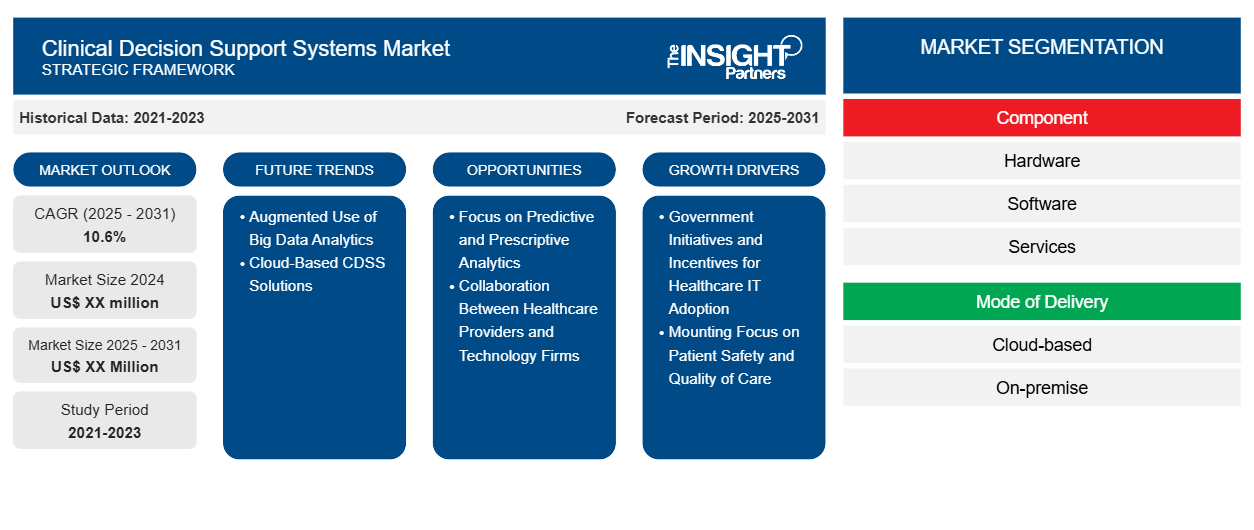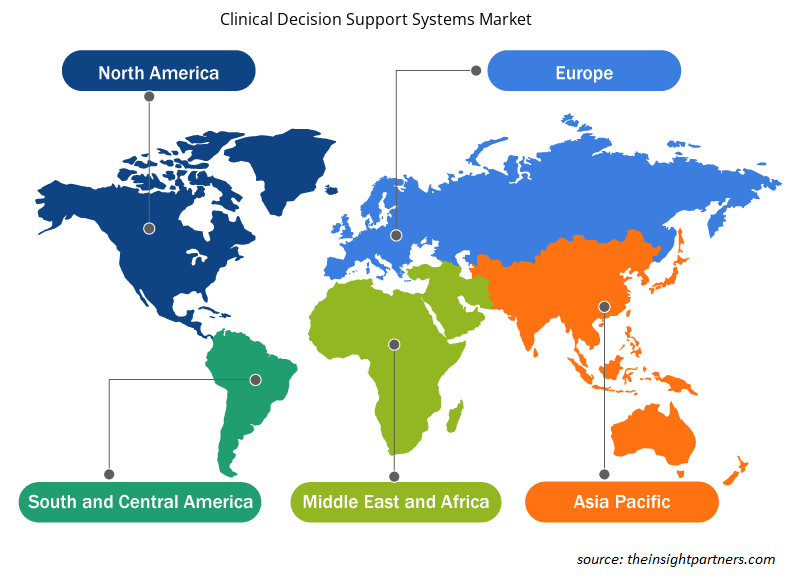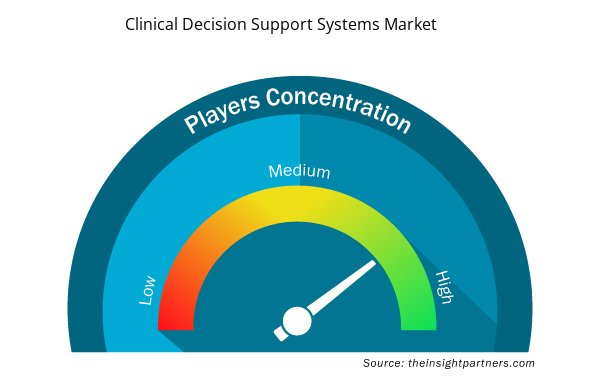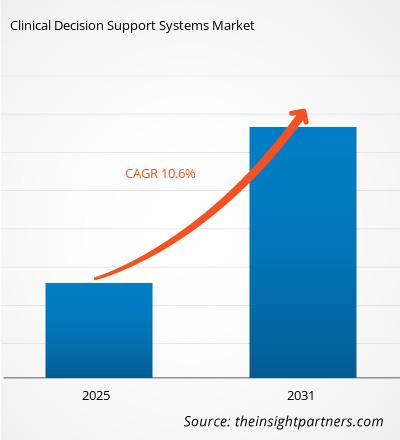The Clinical Decision Support Systems Market is expected to register a CAGR of 10.6% from 2025 to 2031, with a market size expanding from US$ XX million in 2024 to US$ XX Million by 2031.
The report is segmented by Component (Hardware, Software, Services), Mode of Delivery (Cloud-based, On-premise), Product (Integrated CDSS, Standalone CDSS), Application (Medical Diagnosis, Alerts and Reminders, Prescription Decision Support, Information Retrieval, Other Applications). The global analysis is further broken-down at regional level and major countries. The report offers the value in USD for the above analysis and segments
Purpose of the Report
The report Clinical Decision Support Systems Market by The Insight Partners aims to describe the present landscape and future growth, top driving factors, challenges, and opportunities. This will provide insights to various business stakeholders, such as:
- Technology Providers/Manufacturers: To understand the evolving market dynamics and know the potential growth opportunities, enabling them to make informed strategic decisions.
- Investors: To conduct a comprehensive trend analysis regarding the market growth rate, market financial projections, and opportunities that exist across the value chain.
- Regulatory bodies: To regulate policies and police activities in the market with the aim of minimizing abuse, preserving investor trust and confidence, and upholding the integrity and stability of the market.
Clinical Decision Support Systems Market Segmentation
Component
- Hardware
- Software
- Services
Mode of Delivery
- Cloud-based
- On-premise
Product
- Integrated CDSS
- Standalone CDSS
Application
- Medical Diagnosis
- Alerts and Reminders
- Prescription Decision Support
- Information Retrieval
- Other Applications
You will get customization on any report - free of charge - including parts of this report, or country-level analysis, Excel Data pack, as well as avail great offers and discounts for start-ups & universities
Clinical Decision Support Systems Market: Strategic Insights

- Get Top Key Market Trends of this report.This FREE sample will include data analysis, ranging from market trends to estimates and forecasts.
Clinical Decision Support Systems Market Growth Drivers
- Government Initiatives and Incentives for Healthcare IT Adoption: Governments around the world are promoting the adoption of healthcare IT solutions, including CDSS, to improve the quality of care, enhance patient safety, and reduce costs. In the U.S., programs like the Health Information Technology for Economic and Clinical Health (HITECH) Act and Meaningful Use incentives have spurred the adoption of electronic health records (EHRs) and CDSS in healthcare settings. Similar initiatives in other countries further fuel the demand for clinical decision support systems.
- Mounting Focus on Patient Safety and Quality of Care: The healthcare sector globally is focused on improving patient safety and delivery of high-quality care. They are also focused on reducing medical errors and providing enhanced care to patients. A clinical decision support system helps clinicians make informed decisions by providing evidence-based recommendations, alerts, and reminders. This factor enhances patient safety and care quality.
Clinical Decision Support Systems Market Future Trends
- Augmented Use of Big Data Analytics: The healthcare sector is widely embracing digitalization. This shift is leading to the increased use of big data analytics for improved clinical decision-making. The clinical decision support system will increasingly integrate big data analytics, which will enable healthcare providers to make more informed choices based on patient data and clinical outcomes. Government and healthcare institution's investment in big data analytics will drive the use of big data analytics, which further contributes to the clinical decision support system market.
- Cloud-Based CDSS Solutions: Cloud computing is revolutionizing healthcare IT by providing scalable, cost-effective, and easily accessible solutions. Cloud-based CDSS systems enable healthcare providers to access decision support tools remotely, collaborate with other healthcare professionals, and securely share patient data. These systems are also easier to update and maintain, providing flexibility and ensuring that healthcare providers always have access to the latest clinical guidelines and algorithms. As healthcare organizations continue to embrace cloud technologies, cloud-based CDSS will see significant growth.
Clinical Decision Support Systems Market Opportunities
- Focus on Predictive and Prescriptive Analytics: Organizations across the globe are increasingly looking for predictive and prescriptive data analytics solutions that help them not only understand past trends but also predict future scenarios and recommend actions. The demand for such solutions will create an opportunity for market growth.
- Collaboration Between Healthcare Providers and Technology Firms: Strategic collaborations between healthcare providers and technology firms can drive innovation in the CDSS market. Healthcare providers can leverage the expertise of technology companies in areas such as AI, cloud computing, and data analytics to develop more advanced and efficient CDSS solutions. These collaborations can lead to the creation of more intuitive, accurate, and personalized clinical decision support tools, further expanding the market potential.
Clinical Decision Support Systems Market Regional Insights
The regional trends and factors influencing the Clinical Decision Support Systems Market throughout the forecast period have been thoroughly explained by the analysts at Insight Partners. This section also discusses Clinical Decision Support Systems Market segments and geography across North America, Europe, Asia Pacific, Middle East and Africa, and South and Central America.

- Get the Regional Specific Data for Clinical Decision Support Systems Market
Clinical Decision Support Systems Market Report Scope
| Report Attribute | Details |
|---|---|
| Market size in 2024 | US$ XX million |
| Market Size by 2031 | US$ XX Million |
| Global CAGR (2025 - 2031) | 10.6% |
| Historical Data | 2021-2023 |
| Forecast period | 2025-2031 |
| Segments Covered |
By Component
|
| Regions and Countries Covered | North America
|
| Market leaders and key company profiles |
Clinical Decision Support Systems Market Players Density: Understanding Its Impact on Business Dynamics
The Clinical Decision Support Systems Market is growing rapidly, driven by increasing end-user demand due to factors such as evolving consumer preferences, technological advancements, and greater awareness of the product's benefits. As demand rises, businesses are expanding their offerings, innovating to meet consumer needs, and capitalizing on emerging trends, which further fuels market growth.
Market players density refers to the distribution of firms or companies operating within a particular market or industry. It indicates how many competitors (market players) are present in a given market space relative to its size or total market value.
Major Companies operating in the Clinical Decision Support Systems Market are:
- Cerner Corporation
- Medical Information Technology, Inc.
- BD
- Wolters Kluwer N.V.
- Baxter International Inc.
Disclaimer: The companies listed above are not ranked in any particular order.

- Get the Clinical Decision Support Systems Market top key players overview
Key Selling Points
- Comprehensive Coverage: The report comprehensively covers the analysis of products, services, types, and end users of the Clinical Decision Support Systems Market, providing a holistic landscape.
- Expert Analysis: The report is compiled based on the in-depth understanding of industry experts and analysts.
- Up-to-date Information: The report assures business relevance due to its coverage of recent information and data trends.
- Customization Options: This report can be customized to cater to specific client requirements and suit the business strategies aptly.
The research report on the Clinical Decision Support Systems Market can, therefore, help spearhead the trail of decoding and understanding the industry scenario and growth prospects. Although there can be a few valid concerns, the overall benefits of this report tend to outweigh the disadvantages.
- Historical Analysis (2 Years), Base Year, Forecast (7 Years) with CAGR
- PEST and SWOT Analysis
- Market Size Value / Volume - Global, Regional, Country
- Industry and Competitive Landscape
- Excel Dataset



Report Coverage
Revenue forecast, Company Analysis, Industry landscape, Growth factors, and Trends

Segment Covered
Component, Delivery Mode, Application, and End User

Regional Scope
North America, Europe, Asia Pacific, Middle East & Africa, South & Central America

Country Scope
This text is related
to country scope.
Frequently Asked Questions
What are the options available for the customization of this report?
Some of the customization options available based on the request are an additional 3-5 company profiles and country-specific analysis of 3-5 countries of your choice. Customizations are to be requested/discussed before making final order confirmation# as our team would review the same and check the feasibility
What are the deliverable formats of the clinical decision support systems market report?
The report can be delivered in PDF/PPT format; we can also share excel dataset based on the request
What are the future trends of clinical decision support systems market?
Augmented use of big data analytics are likely to remain a key trend in the market.
What are the driving factors impacting global clinical decision support systems market?
Increasing adoption of electronic health records and mounting focus on patient safety and quality of care are the major factors driving the clinical decision support systems market.
What is the expected CAGR of clinical decision support systems market?
The Clinical Decision Support Systems Market is estimated to witness a CAGR of 10.6% from 2023 to 2031
Trends and growth analysis reports related to Technology, Media and Telecommunications : READ MORE..
The List of Companies - clinical decision support systems market
- Cerner Corporation
- Medical Information Technology, Inc.
- BD
- Wolters Kluwer N.V.
- Baxter International Inc.
- Premier
- Koninklijke Philips N.V.
- RELX (Elseiver)
- PeraHealth
- Epic Systems Corporation

 Get Free Sample For
Get Free Sample For